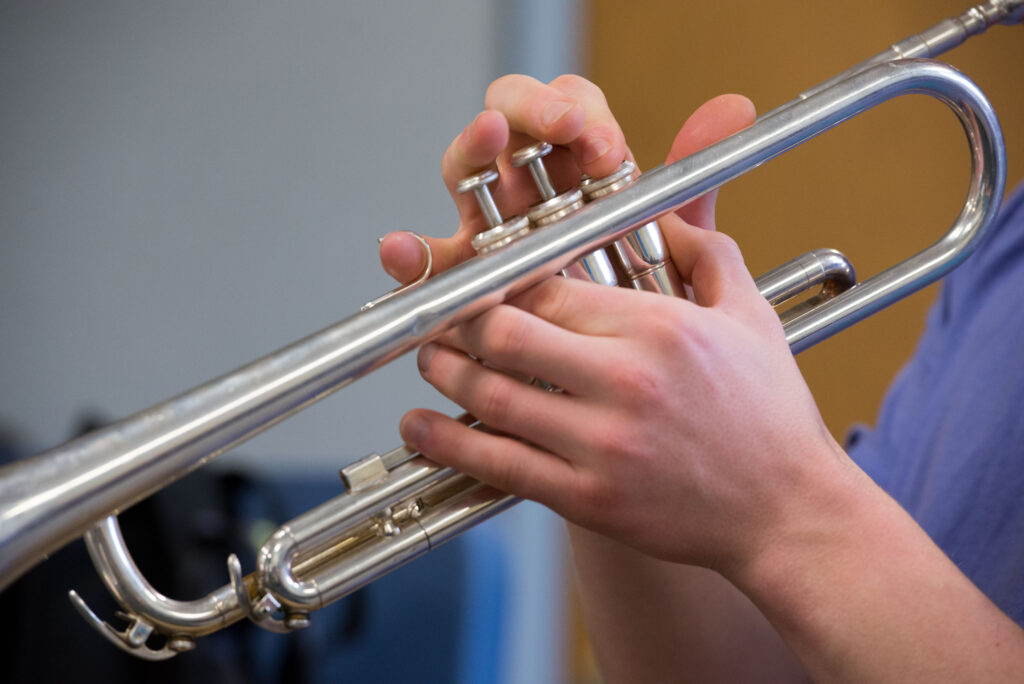Dr. Zachary Grim
How Music Education Supports Academic Skills

As a music educator for over a decade, I’m keenly aware of the benefits of a music education. Music helps develop, improve, and reinforce many skills that are important and beneficial for academics. In my own teaching experience, I have had a number of students who have cited lessons they have learned in my guitar and band classes as skills utilized elsewhere in their academic careers or in their personal lives. A major focus in my classes are the science behind effective practice techniques including the benefits of spaced practice, time management, and the ways that our brains respond to repetitive actions. These skills are not only important for success in one’s music study, but have an impact that reaches far beyond the music classroom.
How Music Supports Students with Reading Challenges
- Rhythm and phonological awareness. Research has shown that a lack of phonemic awareness is the underlying deficit of dyslexia, and that music can improve phonemic awareness. Specifically, it helps with hearing a beat and responding to a beat. And that in turn has translated into good phonemic awareness skills of being able to hear sounds, rhyme sounds, separate sounds, and blend sounds – which are the foundational skills needed for successful reading.
- Auditory perception. Children with dyslexia have difficulty processing the sounds of a letter or group of letters within a word. A key component of music is being able to rapidly manipulate sound(s) – whether with an instrument or vocally. Music helps to strengthen the auditory cortex, the part of the temporal lobe that processes information presented auditorily. It’s believed that this in turn supports growth in reading skills.
- Segmenting. Singing can also help students practice segmenting words, as oftentimes words are more drawn out when sung which helps students to hear the pieces of words.
- Vocabulary and language. Students exposed to a variety of words from a variety of sources, develop good background knowledge and vocabulary development that fosters reading comprehension.
Additional Benefits of Music on Learning
- Supports good executive functioning skills. Music is a great way to practice organization, time management, multi-tasking, and the management of materials – all executive functioning skills that are necessary for academic success. Tasks like remembering to take an instrument to and from school, creating a practice schedule for home, and prioritizing one’s repertoire preparation for rehearsals and concerts are translatable skills to situations like remembering homework and planning how to study for a test.
- Reduces cortisol. Stress and anxiety prohibit students from being available for learning, but music is an incredible stress reliever. Much like mindfulness, music can help students be present and available.
- Increases fine and gross motor skills. The brain and body connection with music to develop motor skills can be seen while watching young children move their bodies to the rhythm of a song, or a budding pianist gaining finger strength. These motor skills are important for academic success (writing, coloring, typing), and correlate to cognitive skills as well.
- Improves self-confidence and self-advocacy. Many students find that music is an area where they gain good self expression, and feel good about their abilities. Self-confidence in other areas can certainly translate to feeling good about academics as well, and being able to advocate for their needs.
- Focusing on strengths. For some students, music may be an area where they are highly talented. When teachers understand and celebrate students’ strengths first (McLean’s Abilities Model® in action!), and then support them with challenges, we set students up for success. I love to uplift students’ talent in music so they can translate that confidence in other areas.
To learn more about McLean School’s music program contact admission@mcleanschool.org